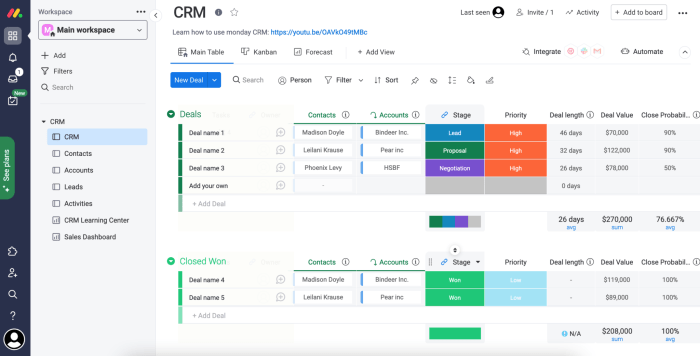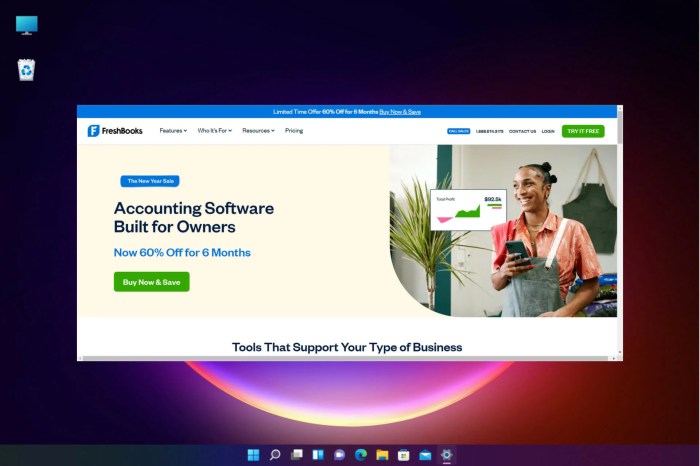Small business crm and accounting software – Running a small business is challenging. Juggling sales, customer relationships, and finances can feel overwhelming. Fortunately, technology offers powerful solutions to streamline these crucial areas. Integrating small business CRM (Customer Relationship Management) and accounting software can significantly improve efficiency, profitability, and overall business health. This comprehensive guide explores the benefits, features, and considerations of combining these essential tools.
Understanding the Synergy Between CRM and Accounting Software
While seemingly distinct, CRM and accounting software are deeply interconnected. A CRM system manages customer interactions, tracking leads, sales, and support interactions. Accounting software handles financial transactions, including invoicing, expense tracking, and reporting. Integrating these systems creates a powerful synergy:
Improved Data Accuracy and Consistency
Manual data entry between separate systems is prone to errors. Integrated solutions eliminate this duplication, ensuring consistent data across both platforms. This reduces discrepancies and improves the reliability of financial and customer data.
Enhanced Reporting and Analytics, Small business crm and accounting software
Combined data provides a holistic view of business performance. Integrated systems offer richer reporting capabilities, enabling analysis of customer behavior, sales trends, and financial performance. This allows for data-driven decision-making.
Streamlined Workflow and Increased Efficiency
Automation is key to efficiency. Integrated systems automate tasks like invoice generation, payment processing, and customer communication, freeing up valuable time for strategic activities.
Better Customer Relationship Management
By linking financial data with customer interactions, you gain a deeper understanding of customer value and profitability. This enables targeted marketing efforts and improved customer service.
Choosing the Right CRM and Accounting Software for Your Small Business
Selecting the right software depends on your specific business needs and budget. Consider these factors:
Scalability
Choose software that can grow with your business. Start with a solution that meets your current needs but has the capacity to handle future growth in terms of customers, transactions, and features.
Integration Capabilities
Ensure the CRM and accounting software seamlessly integrate. Look for solutions that offer native integrations or utilize APIs (Application Programming Interfaces) for smooth data exchange. Consider cloud-based solutions for easier integration.
User-Friendliness
The software should be intuitive and easy to use for your team. A steep learning curve can hinder adoption and negate the benefits of the system. Look for solutions with clear interfaces and helpful documentation.
Features and Functionality
Consider the specific features you need. For CRM, this might include contact management, lead tracking, sales pipeline management, marketing automation, and customer support tools. For accounting, this includes invoicing, expense tracking, financial reporting, payroll, and tax preparation capabilities.
Pricing and Support
Evaluate pricing models (subscription, one-time purchase) and ensure the vendor offers adequate support through documentation, online resources, or dedicated customer service.
Popular CRM and Accounting Software Options for Small Businesses
Many excellent options cater to small businesses. Some popular choices include:
CRM Software:
* Zoho CRM: A comprehensive and affordable CRM with a wide range of features.
HubSpot CRM

Source: jotform.com
A popular free CRM with robust features, ideal for growing businesses.
Salesforce Sales Cloud
A powerful, scalable CRM solution, though more expensive than other options.
Freshsales
A user-friendly CRM known for its ease of use and automation capabilities.
Accounting Software:
* Xero: A cloud-based accounting software popular for its ease of use and integration capabilities.
QuickBooks Online
A widely used cloud-based accounting solution with a range of plans to suit different business sizes.
FreshBooks
A user-friendly accounting software designed for freelancers and small businesses.

Source: windowsreport.com
Wave Accounting
A free accounting software option with limited features, suitable for very small businesses.
Integrating Your CRM and Accounting Software: Best Practices
Effective integration requires careful planning and execution. Consider these best practices:
* Data Migration: Carefully plan and execute the migration of existing data from your old systems to the new integrated solution.

Source: pcquest.com
User Training
Provide comprehensive training to your team on how to use the new software effectively.
Process Optimization
Re-evaluate your business processes to leverage the automation capabilities of the integrated system.
Regular Maintenance
Schedule regular maintenance and updates to ensure the system remains secure and efficient.
Data Security
Implement robust security measures to protect sensitive customer and financial data.
Frequently Asked Questions (FAQ)
- Q: What are the benefits of integrating CRM and accounting software?
A: Integration improves data accuracy, enhances reporting, streamlines workflow, increases efficiency, and provides a better understanding of customer profitability. - Q: How much does CRM and accounting software cost?
A: Costs vary significantly depending on the features, scalability, and vendor. Some offer free plans, while others charge monthly or annual subscriptions. - Q: Is cloud-based software better than on-premise software?
A: Cloud-based software offers greater accessibility, scalability, and ease of integration. However, on-premise solutions might offer more control over data security. - Q: How do I choose the right software for my business?
A: Consider your business needs, budget, scalability requirements, integration capabilities, user-friendliness, and available support. - Q: What if my software doesn’t integrate?
A: Explore third-party integration tools or consider switching to software with native integration capabilities. Manual data entry is a last resort and highly discouraged.
Conclusion
Integrating small business CRM and accounting software is a strategic investment that can significantly improve efficiency, profitability, and overall business success. By carefully selecting the right software and implementing best practices, you can unlock the power of integrated data to drive growth and achieve your business goals.
References
Call to Action
Ready to streamline your business operations? Explore the CRM and accounting software options mentioned above and find the perfect solution to boost your efficiency and profitability. Start your free trial today!
Popular Questions: Small Business Crm And Accounting Software
What are the key benefits of using integrated CRM and accounting software?
Key benefits include streamlined workflows, improved data accuracy, reduced manual data entry, better financial insights, enhanced customer relationship management, and improved decision-making capabilities.
How much does small business CRM and accounting software typically cost?
Pricing varies greatly depending on the features, functionality, and vendor. Expect to find options ranging from affordable monthly subscriptions to more comprehensive, enterprise-level solutions with higher price points.
What are some popular examples of integrated CRM and accounting software?
Many software providers offer integrated solutions. Research specific options to find one that best fits your business needs and budget. Examples include Xero, Zoho CRM and Zoho Books, QuickBooks Online, and FreshBooks.
Is it difficult to learn how to use this type of software?
Most software providers offer user-friendly interfaces and comprehensive training resources, including tutorials and support documentation. The learning curve varies depending on the complexity of the chosen software and the user’s prior experience with similar systems.
